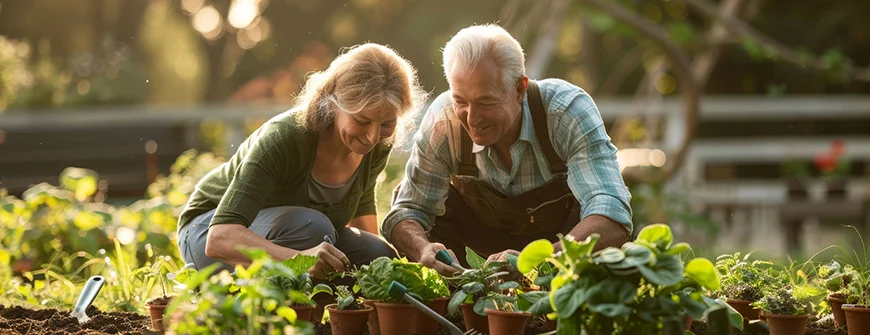Taking care of a loved one with dementia often feels like you’re walking on a tightrope. On one hand, you want to keep them safe and cozy inside. On the other hand, you want them to stay active, engaged, and connected to the world around them. However, it can be hard to achieve a balance in this, especially when daily routines feel repetitive. You may find yourself searching for various outdoor activities that are safe yet enjoyable for people with dementia — this is where gardening comes in.
Whether it’s growing herbs, tending to favorite flowers, or simply enjoying time outdoors, gardening provides active seniors with dementia a meaningful way to stay busy and connected. Learn why gardening works, how it helps, and what tasks are safe for your loved one.
Why Gardening Works for Older Adults With Dementia
Gardening offers a multi-sensory experience. Like walking barefoot in nature or swimming in the beach, your loved one can enjoy the soothing scents of flowers, feel the soil in their fingers, listen to the birds chirping, and watch buds grow. These small experiences, which engage various senses, can provide comfort, reduce stress, and give them a sense of purpose.
In fact, a review reveals that gardening can reduce anxiety, lift one’s mood, and improve sleep quality in older adults with dementia. Unlike other structured activities, it doesn’t feel like “work” or a forced task. Surprisingly, many seniors enjoy basking in the sun while tending to their plants.
The Benefits of Gardening for Dementia
Gardening offers several health benefits for seniors experiencing memory loss problems.
1. It Encourages Physical Activity Without Pressure
Gardening promotes movement without pressure, making it both beneficial and enjoyable. Tending to plants involves stretching, bending, reaching, and walking, which can be considered a low-intensity form of exercise. Pulling weeds or watering plants are opportunities to move more.
2. It Provides a Sense of Purpose
The art of growing a plant out of a seed reflects the purposeful act of nurturing life. For seniors with dementia, witnessing this transformation offers a deep sense of meaning and connection to nature. Nurturing a plant can provide them with a great sense of accomplishment. Gardening can be therapeutic for people with Alzheimer’s and dementia. It gives them a reason to get up in the morning to be productive, reducing the risk of isolation.
3. It Stimulates the Senses and Memory
A study from the University of Edinburgh found that older adults who gardened regularly exhibited better cognitive function, including improved memory and problem-solving skills, compared to those who didn’t engage in gardening. A sensory garden for a loved one with dementia is full of visual, auditory, and tactile elements to explore and enjoy.
Another study found that even short gardening activities can increase levels of brain chemicals, such as brain-derived neurotrophic factor (BDNF) and platelet-derived growth factor (PDGF). These chemicals are associated with memory and cognitive health in older adults. These results suggest that gardening may help support brain function as we age.
4. It Fosters Social Connection
One of the benefits of gardening for individuals with dementia is creating opportunities to socialize with others through community or family gardens. For instance, grandkids can plant and water the pots, alongside their grandparents. In a community setting, the shared space among residents can cultivate meaningful relationships, which benefits your loved one’s social well-being. These moments of togetherness have a profoundly positive impact on them. Gardening can become an avenue for inclusivity and connection, helping to ease feelings of isolation and loneliness.
Common Outdoor Activities for Dementia Care
There are numerous outdoor activities for individuals with dementia to enjoy. What gardening activities are safe for your loved one?
- Watering plants: Hydrating the plants is one of the easiest and most rewarding gardening tasks. Use a lightweight watering can with an easy-to-grip handle. Pre-fill it with the right amount of water your loved one can carry with ease. If they have limited strength, provide a cup with a spout or a spray bottle. Be mindful of puddles as they can be a slipping hazard. This is especially dangerous for someone who’s unsteady on their feet.
- Planting vegetables, herbs, and flowers: Small pots of cherry tomatoes, basil, or parsley are great choices because they tend to grow quickly and can be used as fresh ingredients in meals. Another option is native plants. They thrive with minimal care and are ideal for seniors who want to add a touch of elegance to their garden with minimal maintenance. Witnessing the plants grow can provide a sense of accomplishment and pride in oneself.
- Weeding is a gentle way to move around and stretch. Pulling weeds works the shoulders, arms, and grip strength, helping your loved one maintain their functional strength for daily tasks. Squatting, bending, and shifting weight while weeding improves balance and stability. It’s an easy task that doubles as a light cardiovascular exercise for older people.
- Flower arranging: Picking fresh blooms that your loved one has taken care of themselves and arranging them in a vase turns this simple task into a creative, emotionally comforting activity. Not only is it relaxing, but it also doesn’t require complex memory recall, which is beneficial for people with cognitive impairments.
All of these activities can be adjusted according to your loved one’s mobility and cognitive abilities. Keep the activities simple, safe, and enjoyable so they provide comfort instead of stress.
Outdoor Activities Aside from Gardening
If tending to plants is challenging, there are other outdoor activities that are safe for people with dementia to do. Sitting under a shady tree, taking short walks in nature, or listening to calming music while sipping tea are enjoyable activities to incorporate into their routine. The most important thing is encouraging safe and regular outdoor time.
Gardening Can Be Therapeutic for People With Dementia
By incorporating the hobby of gardening into your loved one's routine, you can make a significant difference in their health and overall well-being. Tending to plants can reduce their stress and anxiety. This emotionally comforting activity also offers a sense of accomplishment and joy. Whether you're setting up a few pots of herbs indoors or building a bigger garden outside, the rewards are well worth it.
Discover local memory care options that nurture your loved one’s passion for gardening. Talk to an expert at Senex Memory Advisors for personalized recommendations.
Syed has years of experience dealing with people, understanding their needs, and helping them find solutions to their problems.
As a Certified Senior Advisor (CSA), Certified Dementia Practitioner (CDP), Certified Montessori Dementia Care Professional (CMDCP), Syed is committed to working closely with Senior and their family knowing what is it like for individuals facing a challenging time, at times groping in dark trying to figure what is the appropriate next step or care level for their unique situation.
Syed and Senex Memory Advisors are fully committed to working closely with families in creating a personalized, step-by-step process memory care plan at zero cost.





Leave a comment